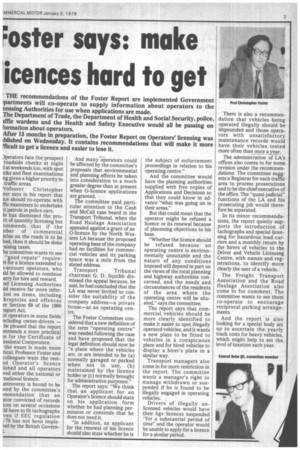oster says: make icences hard to get
Page 5

If you've noticed an error in this article please click here to report it so we can fix it.
' THE recommendations of the Foster Report are implemented Government !partments will co-operate to supply information about operators to the censing Authorities for use when applications are made. The Department of Trade, the Department of Health and Social Security, police, iffic wardens and the Health and Safety Executive would all be passing on formation about operators.
After 13 months in preparation, the Foster Report on Operators' licensing was tblished on Wednesday. It contains recommendations that will make it more fficult to get a licence and easier to lose it.
3perators face the prospect roadside checks at night at weekends too, with spot ?:cks and fleet examinations ng given a higher priority in traffic areas.
)rofessor Christopher ;ter says in his report that ice should co-operate with ffic examiners to undertake it patrols in police cars.
le has dismissed the proct of quantity licensing but ommends that if the -nber of commercial ides on the roads is to be ited, then it should be done -aising taxes.
he committee wants to see "good repute" requireIt for a licence extended to 1-account operators, who be allowed to continue arry for hire and reward. nd Licensing Authorities ild receive far more infor_ion on items, including kruptcies and offences er Section 69 of the 1968 risport Act.
ut operators in some fields ncluding owner-drivers — be pleased that the report immends a more practical m for the Certificate of 'essional Competence.
the exam is made more :deal, Professor Foster and colleagues want the rested Operator's licence lished and all operators wed either the national or national licence.
)ntroversy is bound to be ised by the committee's immendation that an .ator convicted of records ices on several occasions ild have to fit tachographs ven if EEC regulation /70 has not been impleted by the British Governt. And many operators could. be affected by the committee's proposals that environmental and planning .effects be taken into consideration to a much greater degree than at present when 0-licence applications are granted.
The committee paid particular attention to the Cash and McCall case heard in the Transport Tribunal, when the Road Haulage Association appealed against a grant of an 0-licence by the North Western LA because the proposed operating base of the company had no facilities for commercial vehicles and its parking space was a mile from the stated address.
Transport Tribunal chairman G. D. Squibb dismissed the appeal because, he said, he had concluded that the LA was never invited to consider the suitability of the company address—a private house—as an operating centre.
The Foster Committee considered that a new definition of the term "operating centre" was needed following the case and have proposed that the legal definition should now be "a place where the vehicles are, or are intended to be (a) normally garaged or parked when not in use, (b) maintained by the licence holder or (c) normally brought for administrative purposes."
The report says: "We think that an applicant for an Operator's licence should state on his application form whether he had planning permission or contends that he does not need it.
"In addition, an applicant for the renewal of his licence should also state whether he is the subject of enforcement proceedings in relation to his operating centre."
And the committee would have the planning authorities supplied with free copies of Applications and Decisions so that they could know in advance "what was going on in their areas."
But this could mean that the operator might be refused a licence or its renewal because of plannning objections to his base.
"Whether the licence should be refused because an operating centre is environmentally unsuitable and the nature of any conditions imposed will depend in part on the views of the local planning and highway authorities concerned, and the needs and circumstances of the residents of the area where the operating centre will be situated," says the committee.
The report says that commercial vehicles should be more clearly identified to make it easier to spot illegally operated vehicles, and it wants a new plate to be fitted to vehicles in a conspicuous place and for hired vehicles to display a hirer's plate in a similar way.
Transport managers also come in for more restriction in the report. The committee wants a manager's right to manage withdrawn or suspended if he is found to be illegally engaged in operating vehicles.
Drivers of illegally unlicensed vehicles would have their hgv licences suspended "for a substantial period of time" and the operator would be unable to apply for a licence for a similar period. There is also a recommendation that vehicles being operated illegally should be impounded and those operators with unsatisfactory maintenance records would have their vehicles tested more often than once a year.
The administration of LA's offices also comes in for some revision under the recommendations. The committee suggests a Registrar for each traffic area to process prosecutions and to be the chief executive of the office. The "quasi-judicial" functions of the LA and his prosecuting job would therefore be separated.
In its minor recommendations, the report quietly supports the introduction of tachographs and special licensing for hazardous load carriers and a monthly return by the hirers of vehicles to the Driver and Vehicle Licensing Centre, with names and registrations, to identify more clearly the user of a vehicle.
The Freight Transport Association and the Road Haulage Association also come in for comment. The committee wants to see them co-operate to encourage reciprocal parking arrangements.
And the report is also looking for a special body set up to ascertain the yearly track costs for heavy vehicles, which might help to set the level of taxation each year.




















































































